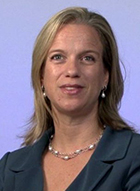APIIF Pilot - Abecedarian Programme, Implemented as Innovative Renewal
Educational quality in daycare (PKD) with a focus on 0-2 year old children.
A practice-based approach focusing on enhancing learning and well-being for all 0-2 year olds in family daycare through responsive social relationships and strengthened child-adult interactions.
Period: 2019 - 2023
Target group: Family daycare children aged 0-2 years in 10-11 municipalities.
Initiative: The project examines how strengthening educational quality in daycare (PKD) with a focus on responsive social relationships and strengthened interactions between child and adult can enhance the social and emotional development and language of all daycare children - regardless of their background.
Educational quality means that learning environments, play, education and caregiving are developed and enhanced as an integrated whole for 0-2 year old children in daycare. Systematic efforts are made to strengthen educational quality by working on responsive relationships and interactions within the context of four key elements: Language Priority, Conversational Reading, Enriched Caregiving and LearningGames. The pedagogy takes into account the child's level of development and requires his or her active participation.
The project is informed by and supports the Strengthened Educational Curriculum, especially focusing on the goal “to organize the educational learning environment so that it takes into account children in vulnerable positions, in order to promote their well-being, learning, development and formation" (Daycare Law of 2018, paragraph 8, part 5). In this context formation refers the child’s active participation in the deeper processes of learning and development that influence the child’s personality (Strengthened Educational Curriculum MasterPlan, 2016, p. 17).
The project is also based on the principles and strategies of the Vygotsky-inspired “Abecedarian Approach”, which in multiple international research studies has demonstrated both short-term and long-term effects including positive outcomes for children's social, emotional and language development.
The initiative is structured as a 2-year professional practice development course, in which family daycare workers collaborate to acquire specific pedagogical principles and skills and develop a new common practice by working in two contexts: learning, joint analysis and critical reflection within the daycare group and daily practice in the home to increase the individual daycare provider’s educational quality.
Pedagocial leaders participate in workshops (a third context) on: 1. the educational content and 2. facilitating learning and developing communities of practice. The project also includes a number of specific resources for both pedagogical leaders and family daycare providers, including: 1. a learning platform containing materials, suggestions, and video examples and 2. implementation and reflection tools.
This project and the associated research study combine a practice-based professional development initiative with an action learning approach that integrates an on-going process for facilitating and supporting organizational change.
Starting in January 2020, agreements with municipalities will be finalized. The initiative will be implemented in 4 modules, each lasting 5 months, starting in August 2020 and going through September/December 2022.
View the presentation of the research project Educational quality in daycare (PKD) from the annual meeting of family daycare managers and providers in Nyborg Strand, 19 November 2019.
Research: To determine whether the initiative has the expected effect, the project is structured as a randomized controlled trial. The researchers are investigating the effects on children's socio-emotional development and language, as well as the specific impact on children in vulnerable positions.
Additionally a PhD project taking an ethnographic, exploratory approach examine the complex factors that facilitate, hinder, or otherwise influence the implementation. The PhD student will use a holistic research design taking into account both the situational and the broader contextual conditions, such as recent daycare legislation.
The PhD project will include a focus on practice, taking into account practitioners’ experiences, learning processes, collaboration, and organizational relationships. It will stress the combination of reflective practice and situated learning. The PhD project may draw on practice theory (e.g., Nicolini, Schatzi), especially the literature on communities of practice (e.g., Lave & Wenger), and/or change theory (e.g., change laboratories (Engeström), translation theory (Røvik)).
Through a combination of impact studies (examining child outcomes) and the PhD student’s nuanced, in-depth exploration of implementation in the educational context, this strong interdisciplinary approach will contribute a new view of implementation and practice theory from an organizational perspective. https://childresearch.au.dk/dagtilbud/kvalitet-laering-og-trivsel/paedagogisk-kvalitet-i-dagplejen/
Partnere: Projektet gennemføres med støtte fra TrygFonden. DPU og VIVE er partnere.
Partners: The project is being implemented with support from TrygFonden. DPU and VIVE are the main partners.
Results: Final results are expected in 2023-2024.


